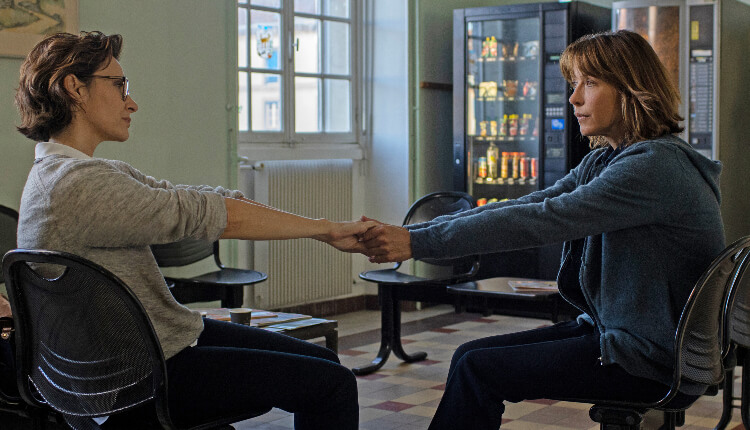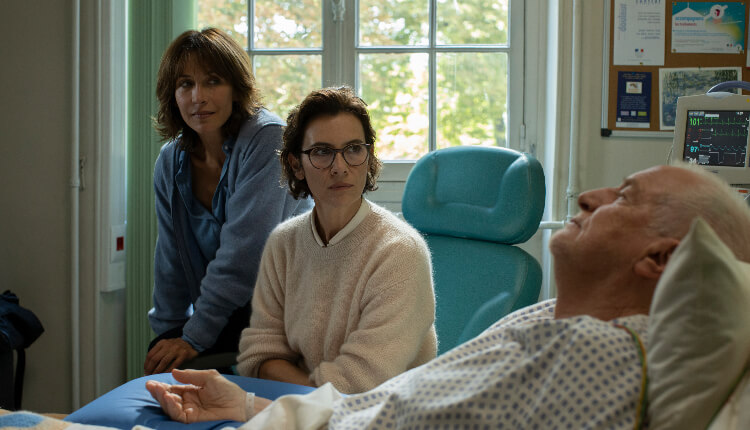Everything Went Fine Film Review | Beautifully Measured Euthanasia Drama Thrives in Moments of Wit
Emmanuèlle (Sophie Marceau), having received an urgent phone call, is on her way out of her building before realising she isn’t wearing her contacts. Her father, André (André Dussollier), we soon learn, has had a stroke. When Emmanuèlle and her sister, Pascale (Géraldine Pailhas) first visit their father, they meet another patient who has had a stroke. The other man is on the mend, eventually seen on his feet with a walking aid. The prognosis need not be dire. André, however, quickly takes a series of turns for the worse. Everything Went Fine, written and directed by François Ozon, is a despairingly humane story about the right to die. Just over a week after his initial admission, André tells Emmanuèlle: “I want you to help me end it.”
As often occurs in stories like this, we learn that André wasn’t always a good father. Our access into his past largely comes from reflections and flashbacks from the perspective of Emmanuèlle. He calls her a stupid child for not knowing how to read a map. He comments on what she eats before admitting that, had he a gun, he would shoot himself in the head. He was a bad father, she later comments to a friend, but she nonetheless loves him. She wishes she had him as a friend. “Then help him, as a friend.”
Assisted suicide is illegal in France, so Emmanuèlle contacts an institute in Switzerland where André can have the death he wants. The sisters meet with a representative from Bern played by an always welcome Hanna Schygulla. They discuss the procedure and the required paperwork. André must be lucid and must be able to drink the mixture himself. The institute medically assists suicide, a key distinction.
Emmanuèlle asks the representative if anyone has ever changed their mind at the last minute. The representative tells of an old man who bought a red dress for his younger wife before attending the clinic. He found his wife to be so beautiful in that dress that he decided not to go through with it. Hearing this in a film makes it sound almost fantastic, a particularly morose fairy tale. But André does express several times the beauty of life and Emmanuèlle evidently takes heart from the story.
André is married to Claude (Charlotte Rampling), a perennially depressed sculptress. There is also a son, Gérard (Grégory Gadebois), whom the sisters invariably refer to as Shithead. The previous year, Gérard kicked André in the knee, resulting in a hospital stay. It seems Shithead is something of a crybaby, an attribute André repeatedly condemns. The family make a few appearances, but the key relationship is between the father and the sisters. It is Emmanuèlle and Pascale who carry out the otherwise unenviable task of arranging the end of one’s life. Neither want their father to die and there are glimmers of hope, such as when André postpones his trip to Bern to attend his grandson’s recital. However, he never shakes from his pursuit of death on his own terms.
One of the doctors caring for André tells Emmanuèlle not to worry: “In the end, they usually choose life.” When death risks becoming reality, we scramble into the familiar confines of life. André is not so easily shaken. Watching the film, I found myself reflecting that cinema has barely learned to deal with death. It is a plot point, something towards which a narrative arcs. Or else it is a game, a bloody (or, with the prevalence of comic book morality, bloodless) spectacle to be imbibed on a Friday night, to keep us distant from the death and violence in our lives.

The film Everything Went Fine most readily calls to mind is Maurice Pialat’s La gueule ouverte (The Mouth Agape). No film has presented the process of dying with such an unflinching eye. Ozon’s film comes close, as he doesn’t shy away from the indignities inflicted upon us as our bodies fail. But to blame cinema for this is too narrow, as we’ve barely learned to deal with death, tout court. We keep the brute reality of death at bay by keeping it irreal, by an unflagging fascination with youth and natality, by giving ourselves over to the spectacular logic of the images from which we do not allow ourselves to stray. In the end, death is no choice.
The film is not without humour. Emmanuèlle, irritated at something her father has done, storms out of a café called ‘La coquille.’ On her way out the door, she inadvertently knocks the ‘q’ off a sign, leaving behind ‘La couille.’ André, of course, laughs. In another scene, he asks his daughters how much the trip to Bern and the appointment at the clinic will cost. €10,000. “How do poor people do it?” Someone replies that they wait to die, to which he responds: “poor things.”
It’s hard to ignore the social milieu of the film, one wherein €10,000 is never in question. Such a narrative can only take place among what André otherwise refers to as the “bloody bourgeoise.” The players in the film don’t struggle to make his desire a reality. There’s a knowing quality to the scene, but the fact remains that to die with dignity is a privilege reserved for those who can afford it.

At their final meal together, Emmanuèlle wears a red dress. Her father is moved only to comment: “You were such an ugly child.” Everything Went Fine briefly threatens to turn thrilling, as the police are informed of André’s plan. Ozon, fortunately, has the good taste to let this dissipate. The final hurdle is an ambulance driver whose religion prohibits suicide. A piano concerto by Brahms, a persistent accompaniment to the film and comfort to the father and sisters, guides us through the film until it quietly approaches its end.
Emmanuèlle and Pascale get drunk together, staying by one another to await the inevitable. In their simplicity, in Ozon’s blunt depiction of the pursuit of dignity, the closing scenes of Everything Went Fine are among the most moving, the most human images I have seen in a long time. What’s left to say besides what the title promises? Tout s’est bien passé.

